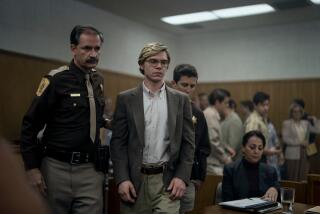Why Silence When Mobs Are White?
- Share via
Racial violence has flared again in New York City. This time a gang of about 30 white youths carrying baseball bats and guns surrounded four black teen-agers who had entered a predominantly white Brooklyn neighborhood to shop for a used car. One of the black youths, Yusef Hawkins, was shot to death.
According to police reports, the attackers mistakenly thought that Hawkins or one of his companions was the new boyfriend of a white girl who had spurned one of the white teen-agers.
The aftermath of this most recent act of mob violence will be carefully watched by African Americans across the country. They will not only monitor whether the white gang members are swiftly brought to justice, but they will also scrutinize how diligently the media follow and report on this case.
Just three months ago, a 28-year-old woman jogging alone in Central Park was attacked by a band of New York City teen-agers. The youths, seven blacks and one Latino, allegedly raped, sodomized and beat the victim, a white investment banker on Wall Street.
Shortly after the crime (which became known as the “wilding” incident) was committed, national headlines trumpeted how vicious and brutal it was and labeled the assailants “savages,” “barbarians” and “a pack of wolves.” National columnists and politicians railed against the attackers, warning that urban blacks had brought American crime to unprecedented levels of ubiquity and barbarism.
The overwhelming majority of African Americans were undoubtedly outraged by the senseless wilding incident and empathized with the young jogger’s family and friends. However, black people were also keenly aware that violence perpetrated by whites against blacks has rarely, if ever, triggered such broad-based, spontaneous white indignation. Yet the Brooklyn murder is just the latest in a stream of white atrocities against blacks that has befouled the history of this Republic.
In the antebellum South, for example, plantation owners frequently flogged, brutalized, raped or killed their slaves under protection of local government and with the assent or quiescence of the nation at large. After slavery, lynching of black men and women was the order of the day. Between 1889 and 1941, according to the Klan Watch Project of the Southern Poverty Law Center, 3,811 black people were lynched for “crimes” such as attempting to register to vote, threatening to sue a white man, joining labor unions, looking at a white woman, being “disrespectful” to a white man--or for no reason at all.
Today, black Americans are still frequent targets of white violence. Sometimes, the crimes are so vicious that they receive national coverage. For example, in 1981 a white mob picked a young black student off the street, cut his throat and hung him from a tree limb in Mobile, Ala. Five years later, a black student was beaten unconscious by a group of whites at the University of Massachusetts at Amherst. During that same year, in Howard Beach, N.Y., a gang of white youths attacked three black men, causing the death of one of them.
Increasingly, the violent crimes committed against blacks are blatantly racist, the perpetrators being members of hate groups like the National Socialist Vanguard, the Order, a neo-nazi group, or various so-called “skinhead” gangs. In our own back yard, the Los Angeles County Human Relations Commission has reported that, of the 95 incidents of racially motivated crimes and violence committed last year in the county, 62 of the victims were black.
The point here is that not just crimes, but brutal and senseless crimes, have long been committed in the United States, generally by white people against blacks. Yet none of these incidents has provoked a national, white outcry for blood or a call for the death penalty. No mainstream newspaper or magazine has ever published the photos of a gang of white juveniles across its cover and labeled them “a pack of wolves.”
So now that another black youth has lost his life at the hands of a white mob, African Americans are intently observing unfolding events. Will the longstanding double standard prevail once again, or will the white majority view the murder of Yusef Hawkins with the same outrage and concern that was expressed after the attack on the jogger in Central Park?
More to Read
Sign up for Essential California
The most important California stories and recommendations in your inbox every morning.
You may occasionally receive promotional content from the Los Angeles Times.










